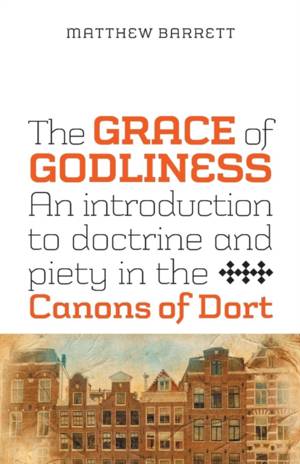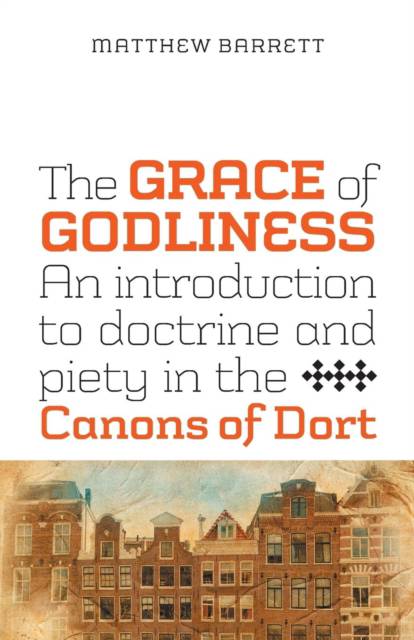
- Afhalen na 1 uur in een winkel met voorraad
- Gratis thuislevering in België vanaf € 30
- Ruim aanbod met 7 miljoen producten
- Afhalen na 1 uur in een winkel met voorraad
- Gratis thuislevering in België vanaf € 30
- Ruim aanbod met 7 miljoen producten
Zoeken
The Grace of Godliness
An Introduction to Doctrine and Piety in the Canons of Dort
Matthew Barrett
Paperback | Engels
€ 18,45
+ 36 punten
Omschrijving
When the pastors and theologians who comprised the Synod of Dort met in 1618 and 1619 to frame a response to the rise of Arminian theology in Dutch churches, they were concerned to provide not just theological argument but pastoral vision. They considered seriously the implications of right theology on both growth in grace and holiness and the spiritual comfort of believers. Keenly aware of this vital link between theology and practice, they drew up the Canons of Dort in a manner that astutely rebutted from Scripture the Arminian Remonstrants, point by point, arguing the veracity of the doctrines of predestination, particular atonement, total depravity, effectual grace and the perseverance of the saints-the five points that have come to be known as ''the doctrines of grace." Matthew Barrett opens a window on the synod's deliberations with the Remonstrants and examines the main emphases of the canons, with special attention on their relationship to biblical piety and spirituality. For example, the doctrine of predestination is shown from Scripture to establish not just God's electing grace but assurance of salvation-comforting believers that the God who saved them will preserve them to the very end. As Dr. Barrett examines the Canons of Dort it becomes clear why they are so important. Indeed, the piety and godliness that saturates these seventeenth-century canons shows they are as relevant for the church today as they were then. Wow! I really like this book. Matthew Barrett has given us history, theology, ministerial counsel and impetus to true piety in this treatment of the Synod and Canons of Dort. The brief but vibrant historical accounts are informative, his guidance in some thick theological discussion is expert, and his focus on piety leads us to the true purpose of all theology-the production of a sincere and pure devotion to Christ. Dr. Barrett's continual insistence on the necessity of monergism for a truly biblical grasp of the character of salvation from beginning to end is a much needed emphasis for contemporary evangelicalism. The appendices provide valuable source material. This is an excellent account of a vitally important subject. -Tom J. Nettles, Professor of Historical Theology, The Southern Baptist Theological Seminary, Louisville, Kentucky Matthew Barrett offers a wonderfully simple and direct exposition of one of the more misunderstood confessions of faith. The Canons of Dort are often vilified, but under closer examination Barrett demonstrates that they are biblical and pastoral and a potent tonic for a flagging faith. Tolle et lege, take up and read! -J.V. Fesko Academic Dean, Professor of Systematic and Historical Theology, Westminster Seminary California By breathing new life into historic events, documents and people, Matthew makes them speak to our culture, our churches and our hearts. -David P. Murray Professor of Old Testament and Practical Theology, Puritan Reformed Theological Seminary, Grand Rapids, Michigan By reducing the discussion of Calvinism and the doctrines of grace to the simplified acrostic T-U-L-I-P, I'm afraid we have generated far more heat than light. A book that looks deeply within, behind and around the five points of Calvinism is long overdue. Whether you find yourself saying "Yea" or "Nay" to the five points, we all need to say thank you to Dr. Barrett for his delightful, informative and light-generating book. -Stephen J. Nichols Research Professor of Christianity and Culture, Lancaster Bible College, Lancaster, Pennsylvania
Specificaties
Betrokkenen
- Auteur(s):
- Uitgeverij:
Inhoud
- Aantal bladzijden:
- 228
- Taal:
- Engels
Eigenschappen
- Productcode (EAN):
- 9781894400527
- Verschijningsdatum:
- 22/04/2013
- Uitvoering:
- Paperback
- Formaat:
- Trade paperback (VS)
- Afmetingen:
- 140 mm x 216 mm
- Gewicht:
- 294 g

Alleen bij Standaard Boekhandel
+ 36 punten op je klantenkaart van Standaard Boekhandel
Beoordelingen
We publiceren alleen reviews die voldoen aan de voorwaarden voor reviews. Bekijk onze voorwaarden voor reviews.











